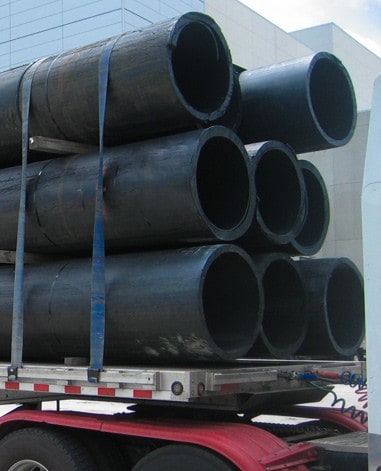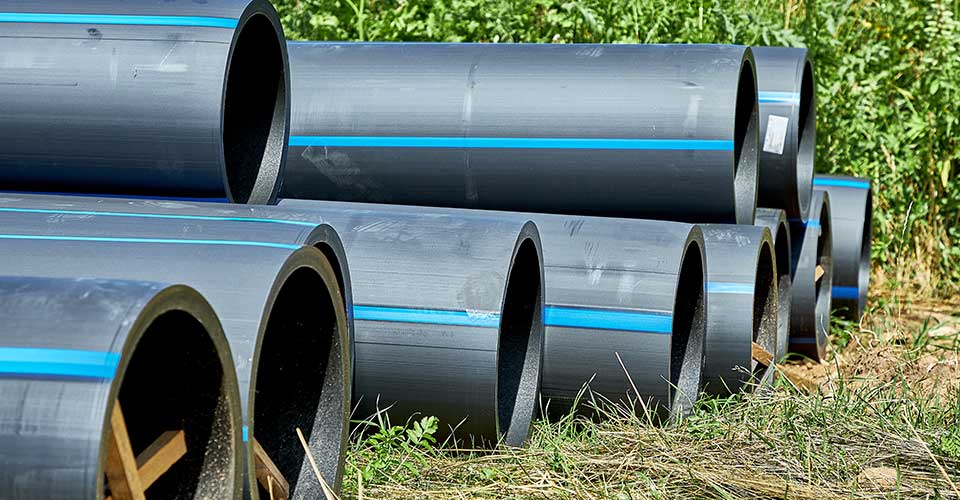A Comprehensive Guide to the Various Usages of HDPE Pipe in Construction and Industry
HDPE pipes have actually become an essential component in modern-day building and commercial applications. Their unique residential or commercial properties, such as resistance to rust and lightweight style, make them suitable for a large range of uses. From water systems to farming irrigation, HDPE pipelines offer services that boost performance and sustainability. Comprehending their diverse applications is essential for professionals seeking to maximize framework. What particular advantages do these pipes offer each market?
Supply Of Water and Circulation Systems
Water supply and circulation systems are critical components of urban facilities, typically counting on high-density polyethylene (HDPE) pipelines for their resilience and effectiveness. These systems transportation safe and clean water from therapy centers to customers, ensuring ease of access and safety and security. HDPE pipelines are favored for their resistance to corrosion, chemicals, and severe temperature levels, which enhances their long life and lowers maintenance prices. In addition, their light-weight nature enables easier setup and transportation, making them suitable for various urban and country applications.
The adaptability of HDPE pipes allows them to be installed in limited areas and around barriers, reducing the requirement for comprehensive excavation (Midland TX HDPE Pipe Fittings in Stock). Moreover, their smooth indoor surface lowers friction losses, boosting water circulation rates. As cities proceed to expand, the demand for reputable water systems increases, positioning HDPE pipes as a lasting remedy for contemporary infrastructure jobs. Their tested track record makes them a preferred choice amongst engineers and urban organizers alike
Wastewater Management and Therapy
Efficient wastewater administration and treatment are crucial for maintaining public wellness and environmental top quality. HDPE pipelines play a crucial role in this procedure due to their resilience, resistance to deterioration, and capability to withstand extreme chemicals. These pipelines are commonly utilized in different applications, consisting of sewer system, stormwater drainage, and wastewater therapy facilities. Their light-weight nature promotes less complicated installation and transport, decreasing labor costs and time.
In enhancement, HDPE pipelines have a smooth indoor surface that minimizes rubbing loss, promoting effective flow prices. They are additionally much less vulnerable to leakages and failures compared to conventional materials, ensuring that contaminants are had properly. Moreover, their flexibility permits flexibility in numerous soil conditions, making them appropriate for varied environmental setups. As sectors increasingly focus on lasting methods, using HDPE pipes in wastewater monitoring systems straightens with goals for minimizing ecological influence and enhancing source recovery.
Agricultural Watering Solutions
In farming settings, reliable watering options are crucial for optimizing plant returns and handling water sources. HDPE (High-Density Polyethylene) pipelines play an essential function in contemporary irrigation systems due to their longevity, flexibility, and resistance to rust. Their capacity to hold up against high stress check makes them excellent for both surface area and subsurface irrigation applications, making sure uniform water distribution across areas.
Farmers can utilize HDPE pipes in drip irrigation systems, which supply water directly to plant origins, lessening wastefulness and advertising healthy and balanced development. Furthermore, these pipes are lightweight and simple to install, reducing labor expenses and setup time. Their lengthy life-span and reduced upkeep Our site needs further enhance their allure in farming practices.
HDPE pipelines are environmentally friendly, as they can be recycled and do not leach unsafe chemicals into the dirt. This makes them a lasting option for farmers intending to take on eco-friendly agricultural approaches while making best use of efficiency.
Industrial Applications and Processes
Adaptability is a characteristic of HDPE pipelines, making them crucial in various commercial applications and processes. These pipelines are commonly used in chemical handling markets because of their outstanding resistance to a vast array of corrosive materials. HDPE's light-weight nature, combined with high tensile stamina, permits simple installation and long-term performance sought after settings.
In the oil and gas industry, HDPE pipelines play a crucial role in delivering hydrocarbons and gases, many thanks to their resilience and versatility - hdpe pipe in stock Midland TX. Furthermore, they are employed in mining procedures for the transportation of slurry and other materials, where standard piping systems might fall short
HDPE pipelines are significantly utilized in producing facilities for water supply lines and wastewater management. Their ability to stand up to extreme temperature levels and stress makes them suitable for a selection of commercial procedures. Generally, HDPE pipes add significantly to effectiveness and safety across varied industrial applications.
Stormwater Administration and Drainage Equipments
Stormwater administration and drain systems are crucial components in city framework, created to manage excess rainfall and reduce flooding dangers. High-density polyethylene (HDPE) pipelines are increasingly made see this website use of in these systems as a result of their durability, adaptability, and resistance to corrosion. These pipelines effectively move stormwater away from inhabited locations, reducing surface area drainage and protecting against waterlogging.
HDPE's lightweight nature promotes easier setup, decreasing labor expenses and building time. Furthermore, its resistance to chemicals and environmental stressors warranties longevity and reliability in different environments. In addition to traditional drain applications, HDPE pipes are also utilized in ingenious solutions such as green framework, which includes rain gardens and permeable sidewalks.

Frequently Asked Concerns
Just How Does HDPE Pipe Contrast to PVC Pipeline in Price?
As a whole, HDPE pipe has a tendency to be extra expensive than PVC pipeline because of its improved durability and flexibility. However, long-term expense factors to consider, such as upkeep and life expectancy, might prefer HDPE in particular applications.

What Is the Life-span of HDPE Pipeline Under Numerous Conditions?
HDPE pipelines commonly have a lifespan of 50 to 100 years, depending on ecological conditions, setup methods, and use. Elements such as temperature level, dirt kind, and direct exposure to chemicals can greatly influence their sturdiness.
Can HDPE Pipes Be Recycled After Use?
Yes, HDPE pipelines can be recycled after use. The reusing procedure involves melting down the material, permitting it to be repurposed right into brand-new items, therefore promoting sustainability and minimizing ecological impact connected with plastic waste.
Exist Any Kind Of Particular Setup Obstacles With HDPE Pipelines?
Installation difficulties with HDPE pipelines include proper jointing techniques, making certain ample trench conditions, and managing thermal expansion. In addition, proficient labor is called for to deal with customized equipment, which can make complex the installation process in different environments.

What Accreditations Should I Look for When Acquiring HDPE Water Lines?
When purchasing HDPE pipelines, one should search for qualifications such as ASTM, AASHTO, and ISO, which validate high quality and compliance with industry criteria, ensuring resilience and efficiency in different applications. - hdpe pipe suppliers Midland TX